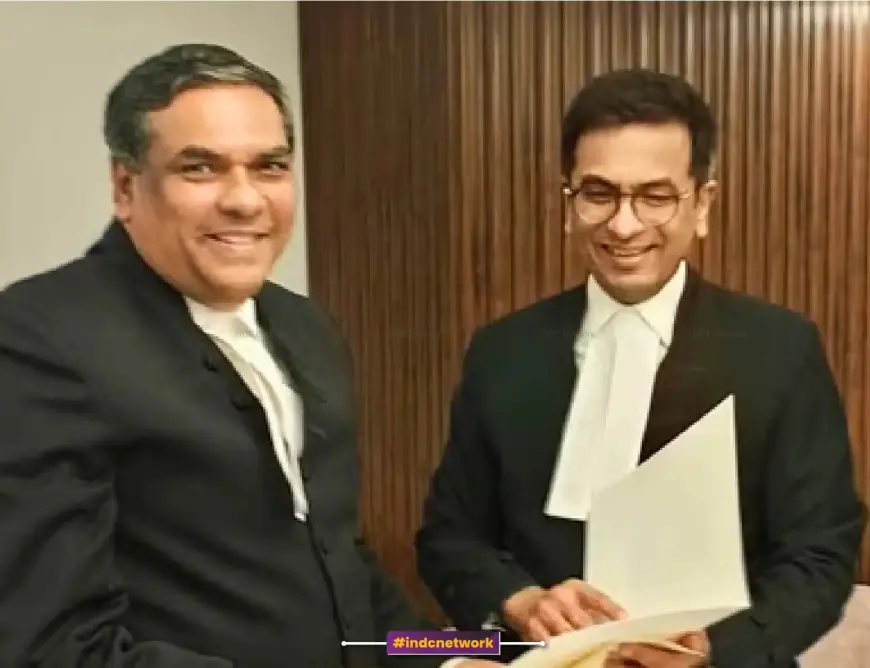Justice Sanjiv Khanna became the 51st Chief Justice of India, know about his historic decisions and career journey
जस्टिस संजीव खन्ना भारत के 51वें मुख्य न्यायाधीश बनने जा रहे हैं। वे 11 नवंबर 2024 को शपथ लेंगे। उनका कार्यकाल करीब छह महीने का होगा, जो 13 मई 2025 को खत्म होगा। उन्होंने अपने करियर में कई ऐतिहासिक फैसले दिए हैं, जिनमें इलेक्टोरल बॉन्ड स्कीम और अनुच्छेद 370 पर अहम फैसले शामिल हैं। उनका न्यायिक करियर 1983 में दिल्ली बार काउंसिल से शुरू हुआ था और वे अपने पारदर्शी रवैये के लिए जाने जाते हैं।

INDC Network: New Delhi: Justice Sanjiv Khanna is set to become the 51st Chief Justice of India. Current Chief Justice DY Chandrachud will retire on November 10, 2024, after which Justice Khanna will take over as CJI on November 11. His tenure will be a little over six months and he will retire on May 13, 2025.
Law Minister Arjun Ram Meghwal announced the news. He said that using the powers vested in the Constitution by the President, after consultation with Chief Justice DY Chandrachud, Justice Sanjiv Khanna has been appointed as the new Chief Justice.
Justice Sanjiv Khanna: Beginning of career and judicial journey
Justice Khanna started his legal career in 1983 with the Delhi Bar Council. He started practising in Tis Hazari Courts and later in the Delhi High Court and various tribunals. He also worked as Senior Standing Counsel for the Income Tax Department and became Standing Counsel (Civil) for the State of Delhi in 2004.
In 2005, he was appointed as an additional judge of the Delhi High Court and became a permanent judge in 2006. In 2019, he was elevated as a judge in the Supreme Court. Justice Khanna specialized in constitutional law, taxation, arbitration and several other matters throughout his career.
Advertisement- With the help of nexstartup.in you can make your business even better. Do give a chance to Nexstartup to serve you because they work on quality.
- Graphic Designing
- Video Editing
- Digital Marketing
- Web Development
- App Development
- UI & UX Design
and many more services......
Important verdicts and legal approaches
Justice Sanjiv Khanna has delivered several landmark and important judgements during his tenure. One of them came in 2024, when he played a key role in the judgement declaring the electoral bond scheme unconstitutional. He believed that the electoral bond scheme lacked transparency and violated the Right to Information, as the identity of the donors was known to the bank officials. This judgement brought forth the importance of transparency in electoral funding.
In 2023, Justice Khanna was part of a five-judge bench that upheld the decision to remove Article 370 from Jammu and Kashmir. He said that the repeal of Article 370 did not affect the federal structure and it represented asymmetric federalism.
Another important decision came in 2019 when he declared that the office of the Chief Justice of India comes under the Right to Information (RTI) Act. This decision was important for balancing transparency and confidentiality in the judiciary.
Social and legal contributions
Justice Khanna is currently the Executive Chairman of the National Legal Services Authority and a member of the Governing Council of the National Judicial Academy. He has also headed legal bodies such as the Delhi Judicial Academy and the Delhi International Arbitration Centre. His contributions have established him as an important figure in the Indian judiciary.
His judicial style pays special attention to transparency and judicial balance. His decisions have been important for the welfare of the society and protection of constitutional values.
Upcoming term and challenges
After taking oath on November 11, 2024, Justice Khanna will have several important legal challenges to resolve. His tenure may be short, but his judicial style and commitment to transparency will make him an important and influential Chief Justice. There are high expectations about the role of the Supreme Court under his leadership, especially given his approach to constitutional and social issues.










